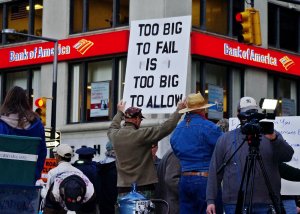A prominent American banker – Gary Cohn, chief operating officer of Goldman Sachs – opined recently to Politico:
We need to go from pure paranoia to just scared. Just scared would be a big improvement. I’m not asking for good I’m asking for just scared. And we could get there through a variety of things, whether it be corporate tax reform, immigration reform, repatriation, getting a budget in place, funding the government, entitlement reform. All these things, each and every one, can move confidence two degrees. Get two of them, you move four degrees and you go from scared to just a little concerned.
Calling for a restoration of business confidence in the United States makes sense, and it would be good to have more trust in Washington. But it is also greatly ironic to hear this from a banker, because it is the reckless expansion of risks within the financial system that led directly to our recession, slow recovery, and the destruction of political and economic trust.
John McMillan and Chris Woodruff did pioneering work on trust in Vietnam during the 1990s. They found that trust can develop between private businesspeople, even when the legal enforcement of contracts is weak. What trust requires is repeated interactions, sufficient transparency in what happens, and, of course, gains from trade.
When credit was disrupted in the fall of 2008, this scared businesses of all kinds. Those who had grown accustomed to trusting their suppliers or customers needed to rethink that kind of relationship. Companies hold much more cash, in part because they don’t trust each other – and they don’t trust the government.
In their book Why Nations Fail, Daron Acemoglu and James Robinson identify institutions – economic and political rules of the game – as the fundamental determinant of long-run economic prosperity. But for any institution to have value, it must be legitimate. If people don’t believe that institutions are fair and substantially efficient, why would they want to become educated and make investments?
Acemoglu and Robinson further emphasize that institutions need to be sufficiently inclusive – providing a reasonable degree of protection for property rights to a broad cross-section of society. Nothing is fully inclusive; some groups always have some kind of advantage. But this is still an important criteria – unless enough people feel reasonably secure in their rights, it is hard to sustain economic growth.
But again, what happened from 2008 to 2009? A few big banks received very generous amounts of support from the central bank and the government. There is still an argument about whether the full extent of this generosity was excessive.
But there is no argument that the same kind of support was not provided to homeowners.
Defenders of the big banks argue that the value of their assets has recovered – so really these were just liquidity loans. But exactly the same could be said for homeowners. If they had been allowed to refinance their mortgages at low interest rates, many of them would have avoided foreclosure and now would no longer be “underwater” on their mortgages.
Harvard professor Marty Feldstein proposed an innovative way to allow mortgage refinancing, early enough to have made a difference. But he was widely ignored, in part because officials argued that such a scheme would encourage moral hazard or that it involved unreasonable risks to the government.
But the assistance provided to banks was hugely risky. If you do the same thing 20 times, you will be lucky to make a profit more than twice. In the history of bank bailout programs around the world, most lose money.
And we have exacerbated the moral hazard that was already lurking in our financial system.
Looking at this arrangement, it is no wonder that so many people are angry. And it is also not a surprise that the Tea Party Republicans have mobilized so much support against the government.
Our problem is not that both political parties have become more extreme and less willing to compromise in recent years. It is that elements of the Republican Party have become both more extreme and much stronger electorally – including in the House of Representatives.
To be sure, gerrymandering districts plays a role – and there are some deep-pocketed donors helping many of the supposedly grass-roots initiatives.
But don’t dismiss the Tea Party. It represents a deep breakdown of the most fundamental but also most precarious trust in our society – trust in economic and political fairness.
Blaming the government may not be everyone’s reaction. But who allowed some banks to become really big and very dangerous? Bank executives wanted this and paid handsomely for the privilege — through completely legal forms of lobbying and influencing. But ultimately it was politicians who played ball.
And why did the politicians do this? Because the best way to get elected in the modern United States is to vote for measures that boost credit and increase asset prices.




